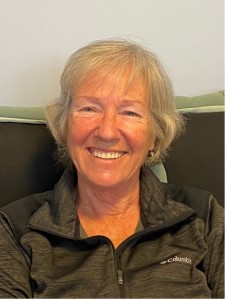By The EDR Program Team
Learn more about Michele Straube, the Founder and former Director of the EDR Program, and her lessons learned from a career in conflict resolution. We are pleased to celebrate Michele, who has been named Peacekeeper of the Year by the Utah Council on Conflict Resolution. The annual award honors the long-standing commitment to promoting peace and conflict resolution in the larger community. In receiving this award, Ms. Straube joins an impressive list of 23 previous award recipients, many of whom were her teachers or mentors. The statement of Ms. Straube’s qualifications for the award can be found here.
To hear more of Michele’s wisdom, we encourage you to listen to this interview with her, which was conducted by Larry Schooler for the American Bar Association Dispute Resolution Section Resolutions podcast.
 What is it about collaborative process that fascinates you?
What is it about collaborative process that fascinates you?
Michele Straube (MS): After working together for a while (usually 6-plus months), collaborative groups change how they deal with each other. They learn how to negotiate on the basis of interests, and to co-create solutions that work for everyone. They don’t even necessarily know that they’re doing this. For me, that’s the magic. That’s why I kept doing it.
Can you think of some foundational principles or core values for your work as an environmental / public policy mediator?
MS: Interest-based negotiation: Asking questions during negotiations to identify all parties’ interests, and developing solutions to satisfy those interests, rather than each party thinking they have the perfect solution.
Core values of the International Association for Public Participation (IAP2): 7 core values, all supporting the fundamental premise that members of the public who are potentially affected by a decision have the right to be involved in the decision-making process.
Neuroscience of conflict / collaboration: All information that comes into our brain comes in through the emotional processing circuits first. Until we acknowledge and self-regulate our emotions with intention, rational thinking is physically impossible. We need to work with the brain, rather than against the brain.
What’s unique about environmental disputes, and why are they well suited to collaborative efforts?
MS: Especially in the West, stakeholders feel passionately about environmental and natural resource (ENR) issues, so they are high-stakes, high-emotion conflicts.
For many ENR disputes, there is a lack of data or disagreement about the facts. This presents an opportunity to learn together, and to collaboratively implement adaptive management (you try something, you figure out whether it worked the way you intended, you make changes and try something different, you evaluate, you adapt, etc.)
You’re not only solving an immediate problem, you’re creating long-term working relationships.
As an example, negotiating regulations through a collaborative process saves time in the long-run. The usual process for developing regulations is time-consuming with the agency proposing a regulation, offering a notice-and-comment period, then a legal challenge to the regulations, then another notice-and-comment period for a revised regulation, then possibly another legal challenge. Using a stakeholder group with representatives of the major interests to co-create a regulation that everyone can support, the regulation may become final and implementable much faster.
Get notified when new articles are posted to the EDR blog – sign up for our email list »
What makes for an effective participant in a collaborative process?
MS: Best practice is to do a situation/readiness assessment to identify all interests, who best to represent each interest, which issues are ripe for problem-solving, etc.
Qualities of an effective participant: curiosity about issues and other people in the group, open mind, articulate, good communicator (within the collaborative group and with others in their interest group who are not a direct part of the collaboration).
How do you suggest we promote and encourage the use of ADR/mediation?
MS: Raising awareness about non-litigation approaches during law school and in the stakeholder community.
Making something like the Conflict Management course I designed and taught mandatory for all law students. In that class, students were exposed to the dispute resolution processes used most frequently in the American judicial system (negotiation, mediation, arbitration and litigation). The course also addressed different models of decision-making, as well as a variety of strategies for preventing and managing conflict used in both civil and criminal contexts (collaborative law, preventive law, legal conflict audits, collaborative problem solving, community-based decision-making, and restorative justice).
Exposing as many ENR stakeholders as possible to collaborative problem-solving principles and case studies, and having them apply those principles to their own real-life examples, as the EDR Program does in its Effective Natural Resources Collaboration Course.
What are some of the most vital skills for people doing collaborative problem-solving?
MS: Curiosity/open mind, being an active listener, understanding of interest-based negotiation.
What is one interesting fact about you most people don’t know?
MS: Mediation was not my first career choice. I wanted to be a nun (I went to Catholic middle and high school), then a ballet dancer (was heartbroken when the local ballet company didn’t accept me), then a linguist (have come back around to that interest in retirement), and only then happened upon law, which brought me to mediation and conflict resolution.
What is one final nugget of wisdom for our readers?
MS: Neuroscience also tells us that our brains unconsciously mirror behaviors of others. One of my main roles as a facilitator/mediator was to model calm and constructive reactions to conflict. Without knowing it, the stakeholders’ mirror neurons were helping them to react in a similar, calm(er) fashion. This is a secret power that each individual in conflict holds; manage your own reactions, and hopefully the person(s) you’re in conflict with will follow that lead.
